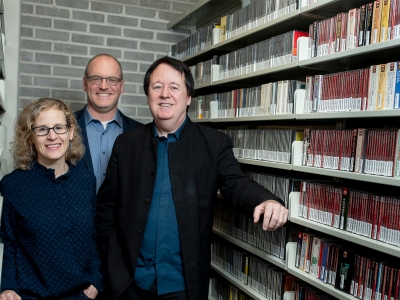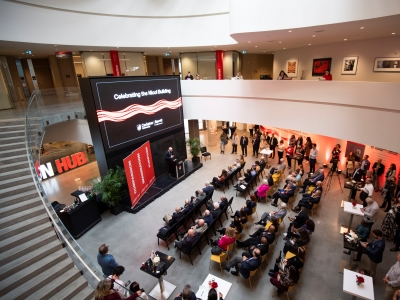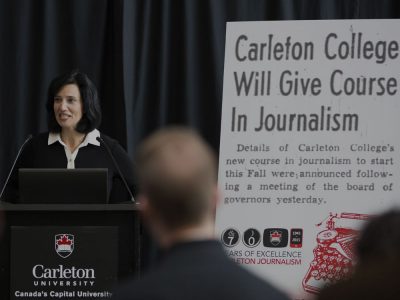By Dan Rubinstein
When Political Science Prof. Chris Brown and his colleagues were preparing for this fall’s launch of the new Bachelor of Global and International Studies (BGInS), they came up with a target intake of about 160 students.
That figure was a guesstimate based on other schools with somewhat similar programs and a percentage of Carleton’s total Bachelor of Arts population.
But BGInS offers a unique interdisciplinary approach and several other innovative features, and it has attracted about 240 students — part of an increase in overall undergraduate enrolment at the university for the 2015-‘16 academic year.
“I don’t want to crow, but I think we’ve designed something that’s pretty exciting, and the proof is that students are picking up on it,” says Brown, the director of BGInS, which includes an international experience requirement and is the first program in Canada to purposefully combine the concepts of “global” and “international.” Scholars with a global focus tend to draw insights from the humanities and concentrate on issues of identity and belonging, while those with an international focus generally explore economics, law, politics and conflict through the lens of the nation state.
“Students are interested in the world,” says Brown, “but they’re interested in different aspects of it. They don’t want to look at it through one perspective. We have to get away from the mindset where we only offer traditional academic disciplines and students have to accept these programs and get into our boxes. The world is changing.”
Overall, compared to 2014-‘15, undergraduate enrolment at Carleton is expected to grow 1.9 percent to more than 20,000, while the number of full-time first-year students is expected to increase by 3.2 percent to 6,300, despite changing demographics in Ontario and a decline in the number of university-age residents.
“Over the past several years, Carleton has seen steady increases in our undergraduate enrolment,” says Suzanne Blanchard, Vice-President (Students and Enrolment). “This can be attributed to our strong recruitment efforts in Ottawa and the Greater Toronto Area and our continued growth of international recruitment.
The creation of new programs like the Bachelor of Health Sciences and BGInS, and an increase in applicants to our programs in science, technology, engineering and math, have contributed to positive enrolment.
“Carleton offers strong programs that are interdisciplinary and provide hands-on learning opportunities,” continues Blanchard. “These elements are important to our prospective and current students and are a part of what attracts them to Carleton.”
The university’s Criminology and Criminal Justice program also has an interdisciplinary approach and undergraduate enrolment increased 12.2 per cent compared with last year. By incorporating the disciplines of law, psychology and sociology, the program gives students a well-rounded education and a range of career choices, says Evelyn Maeder, director of the Institute of Criminology and Criminal Justice.
“This is an area students are really starting to take an interest in,” she says, noting that a field placement program in year three or four provides experience with the RCMP, in Crown prosecutor and parole offices, and with other potential employers.
“Students can see how different fields deal with the same issue.”
Several other programs have seen large increases in enrolment: the BA (Honours) in English is up 19.1 per cent over 2014-‘15, Bachelor of Humanities 29.3 per cent, Bachelor of IT (networking stream) 27.6 per cent, Bachelor of Math 30.2 per cent and Bachelor of Computer Science 36.2 per cent.
Interest in computer science is on the rise across Canada, says Prof. Doug Howe, director of Carleton’s School of Computer Science. Since a low point around 2005 in the wake of the dot-com bust, when annual intake dropped to some 40 new students, numbers have been increasing steadily thanks to the marketable job skills the field promises.
Carleton’s undergraduate computer science program, which has nearly 1,400 students and just under 400 first-year students in 2015-‘16, made a couple of key changes now paying dividends. Its game development and security streams, started in 2007 and 2008 respectively, have become very attractive, says Howe.
“We’ve also put a lot of effort into our undergraduate teaching,” he adds, “especially at the first- and second-year level.”
The department hired professors who specialize in teaching and some of its best researchers have put extra energy into engaging students in the classroom.
“We’ve still a research-intensive department,” says Howe, “but I think we’ve gained a reputation for our high-quality teaching as well.”
To spread the word about Carleton’s strengths, recruitment officers visit more than 400 schools across the country every year; they give presentations, attend parent evenings and school fairs, and meet with students and parents. Last year, international recruiters visited 69 cities in 45 countries. Carleton also hosts popular annual campus events such as CU Preview Days in the fall, as well as parents’ evenings in Ottawa and the GTA.
“The Undergraduate Recruitment Office and Admissions Services work closely with the academic departments to ensure our best ambassadors are at events across Canada and the world and are speaking to prospective students so they have all the information they need when selecting a university,” says Blanchard. “Carleton is known for its exceptional student support. Students know they will be joining a campus community that will support them through their studies.”
Friday, September 25, 2015 in New/Unique Programs
Share: Twitter, Facebook



